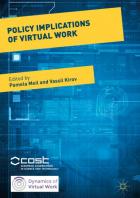Scientific Publications

Technical and Economic Evaluation of Dual-mode Trollybus Programmes - Final Report Theme 6 - Economic Study

1997 Meeting of COST 822 Working Group IV Molecular Aspects of Differentiation and Transformation

Original Document

Glossaire de Genetique Moleculaire et Genie Genetique

Rapport Annuel 1993/1994/1995

Database, Monitoring and Modelling of Urban Air Pollution

New Radiotracers and Methods of Quality Assurance for Nuclear Medicine Application - First Annual Report 1993-1994

AIR- Agriculure, Agro-industry, Fisheries - Non-food Projects (Chemical, Bioenergy, Forestry)

Policy Implications of Virtual Work
- Author(s): Meil, P., Kirov, V. (Eds.)
- Publisher(s): Palgrave Macmillan
- http://www.palgrave.com/us/book/9783319520568#reviews
Digital technologies have changed the workplace and the way we work. COST Action IS1202 – “Dynamics of Virtual Work” has gathered a group of specialists from 30 European countries and many associated institutes in other parts of the world to discuss how the new forms of digital work should be reflected in labour policies across Europe and beyond.
